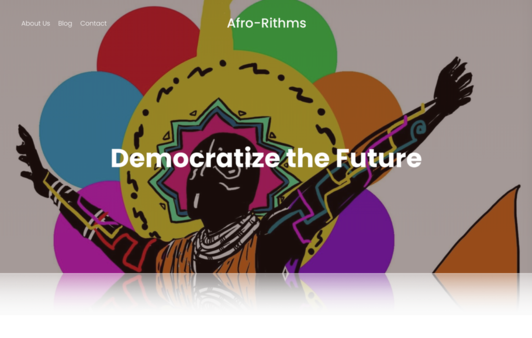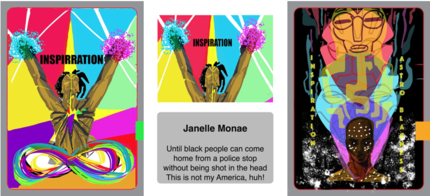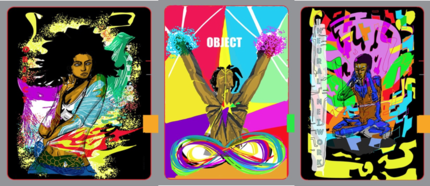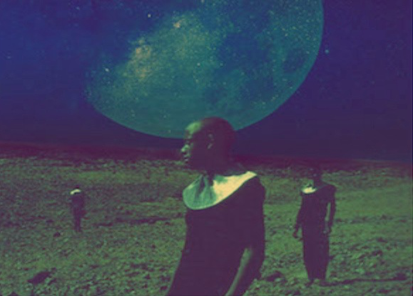Future Now
The IFTF Blog
Afro-Rithms from the Future

RADICAL FUTURES GAMING A reparations tattoo? I think you just won the game!
The year is 2030, and on a series of clandestine floating islands, the Global Afronet, is weaving a tapestry of the future. Each island hosts a unique city, with a single Futurescope at its center. Citizens visit the Futurescope, an enormous structure featuring floors of research labs and art galleries, pierced through the center by a bundle of glowing wires. These wires run throughout the building, eventually converging in an orb that floats atop the building. The collective work and energy of the building diffuses through the orb, creating the perfect setting for citizens of the island to meet and collaborate on visions of the future.
As these visions are produced, they link to the network of stories created by Afro-Futurescopes across the planet, creating a colossal map for an ultimate journey through the Astro-Blackness Plane where we rise above our colonized past and see the full universe.
So begins a card game called Afro-Rithms from the Future. Created by Lonny Brooks and game developer Eli Kosminsky, and facilitated by Ahmed Best, host of the The Afrofuturist Podcast, the game is designed to draw out unexpected possibilities, encourage radical reimagining, and collaboratively produce visions of diverse futures.
Its Afrofuturist imagery reflects Black-centered signals, with alternative visions we call the Black Fantastic, from Richard Iton (2008). Players sense the minor-key sensibilities generated from the underground of radical Black art. Designing a game from this perspective offers a pathway to grapple with notions of inclusion, equality and liberation. Several Black and BIPOC artists have contributed and shaped the card deck with their pulse on the Black Fantastic of visionary images.
As a whole, the Afro-Rithms from the Future game expresses its values through its structure and game rules:
1) Afro-Rithms from the Future is a forecasting game that suggests that by changing the traditional white, patriarchal normative gaze of racism and lens through which we usually view the world, we aim to change the societal “game” to expand alternative perceptions of the world through Black and BIPOC perspectives, where Black and BIPOC futures are central and matter.
2) The term Afro-Rithms intentionally focuses on shifting the cultural lens to understand the powerful ubiquity of algorithms in our digital world(s). Afro-Rithms from the Future shifts the lens through which we digitally reinforce and perpetuate dominant inequities, enabling us to expand the range of possible, more equitable, liberating multiverses.
3) We not only aim to democratize the future, we intentionally anticipate democratic Anti-Racist Futures and to build resiliency for the formidable challenges to those futures.
4) A central question driving this game asks how do we democratize the Future with Afro-Queer AI as the starting point to anticipate, imagine and create liberating, inclusive futures with multiple forms of intelligences?

The game is a dynamic, engaging, and safe space for a community to imagine possible worlds using ordinary objects as inspirations to rethink existing organizational, institutional, and societal relationships.
During the AfroFutures Festival at IFTF, where we facilitated a group game session in March 2019, the winner of the game by declaration was a woman who imagined a tattoo that represented one’s history and could be scanned to receive reparation funds to redress and heal the trauma of slavery.

Summarizing all the features of the future that the group imagined in that gameplay, Kominsky said: “Our future has tattoos that store memories and produce reparations from one generation to the next. It has a power glove that can snap away the police. It has infinity stones, and its temperature regulated. It has a black skirt that cannot be penetrated—it’s bulletproof and reflects and amplifies the sounds in the surroundings. It has stories that induce deep empathy and self-care and naps. It deconstructs colonialism, especially for women”.
The creators of Afro-Rithms from the Future have gone on to stage a launch event to present the game as a large scale world-building tool, in conjunction with the Afrofuturist Podcast, last May (2019). In 2020, we are working to develop Afro-Rithms as a smaller, group card deck and playtesting it with various educational, museum, theater, technology groups and organizations seeking to generate and activate anti-racist cultures. If you are interested in taking part in a playtest, or supporting the effort to center Black and BIPOC futures, please contact us at dr.brooks@gmail.com or contact us through our website: www.afrorithms.com.
Fathomers and the Equitable Games Group with our graphic designer Paula Te are supporting Brooks, Best, and Kosminsky in the ongoing public play-testing and refinement of the game for eventual public release and distribution as a school curriculum tool. To date, the game has been presented at the Institute for the Future, in Palo Alto; Dynamicland, in Oakland; Black Speculative Arts Movement festivals in Oakland and Los Angeles, in Leimert Park; and at NeueHouse Hollywood. Actions to come include the commission of game card artwork, box art and design, and a formal launch through our website afrorithms.com and Los Angeles-based youth education organizations.
(Card logo images by Alan Clark, 2019, and center image: “Brave New World” by Damon Davis)




